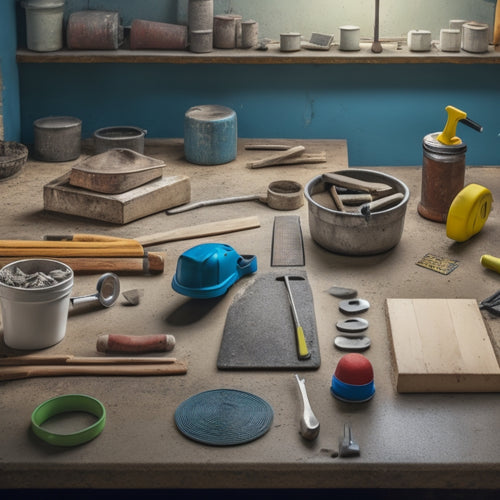
Demolish Concrete Homes With These Essential Tools
Share
When demolishing a concrete home, you'll require a strategic arsenal of specialized tools to get the job done efficiently. Pneumatic breakers will shatter concrete into manageable pieces, while hydraulic crushers offer precision and control for targeted demolition. Electric demolition hammers are ideal for smaller, accessible structures, and hand tools are essential for removing residual concrete and working in tight spaces. Don't forget safety equipment, including hard hats, safety goggles, and steel-toed boots, to protect yourself from falling debris and flying particles. With these essential tools, you'll be well-equipped to tackle the demolition process - and there's more to learn about optimizing your strategy.
Key Takeaways
• Pneumatic breakers are ideal for heavy lifting and shattering concrete into manageable pieces, requiring regular maintenance for consistency.
• Hydraulic crushers offer precision and control for targeted demolition, delivering concentrated force while minimizing unnecessary damage.
• Electric demolition hammers are best suited for smaller, accessible concrete structures or confined spaces, with selection based on project type.
• Hand tools, such as chisels and putty knives, are essential for removing residual concrete and working in tight spaces, requiring gentle techniques.
• Safety equipment, including hard hats, safety goggles, and steel-toed boots, is crucial for protecting operators from falling debris and flying particles.
Pneumatic Breakers for Heavy Lifting
Operate a pneumatic breaker to shatter concrete into manageable pieces, leveraging its immense force to pulverize even the thickest slabs.
With proper pneumatic breaker maintenance, you'll guarantee consistent performance and extend the tool's lifespan. Regularly inspect the breaker's air hose, checking for signs of wear or damage, and replace it if necessary. Additionally, lubricate the breaker's moving parts to reduce friction and prevent overheating.
The pneumatic breaker's advantages lie in its ability to deliver high-powered blows without the need for electricity, making it an ideal choice for remote or confined demolition sites. Its portability and versatility also enable you to tackle a wide range of concrete demolition tasks, from breaking up sidewalks to dismantling foundations.
When selecting a pneumatic breaker, consider the weight and size of the tool, as well as the air pressure and flow rate required to operate it efficiently. By choosing the right pneumatic breaker and maintaining it properly, you'll be able to tackle even the toughest concrete demolition projects with ease and precision.
Hydraulic Crushers for Precise Demolition
When you need to demolish concrete structures with precision, hydraulic crushers become the tool of choice, offering a level of control and finesse that pneumatic breakers can't match. These machines utilize hydraulic efficiency to deliver a concentrated force, allowing you to target specific areas of the structure without causing unnecessary damage. This precision is essential when working with concrete, as it helps maintain structural integrity and prevents unnecessary destruction.
With hydraulic crushers, you can expect a higher level of accuracy and control, making them ideal for delicate demolition projects. The hydraulic system provides a smooth, consistent flow of power, enabling you to make precise cuts and breaks. This results in less waste, reduced noise, and a safer working environment.
Additionally, hydraulic crushers are designed to be more efficient, reducing the physical strain on operators and increasing overall productivity. By incorporating hydraulic crushers into your demolition arsenal, you'll be able to tackle complex projects with confidence and precision, ensuring a successful outcome every time.
Electric Demolition Hammers Needed
You'll typically reach for electric demolition hammers when tackling smaller, more accessible concrete structures or when working in confined spaces where larger equipment can't fit. These versatile tools are ideal for breaking up concrete floors, walls, and foundations, as well as removing tile, asphalt, and other stubborn materials.
When selecting an electric demolition hammer, consider the type of project you're working on and choose accordingly. For example, rotary hammers are perfect for drilling into concrete, while demolition hammers with chiseling bits are better suited for breaking up large areas of concrete.
To get the most out of your electric demolition hammer, it's crucial to master various demolition hammer techniques. Start by applying gentle to moderate pressure, gradually increasing the force as needed. Always maintain control of the tool, keeping it at a 45-degree angle to the surface. This will help prevent the bit from getting stuck and reduce fatigue.
Additionally, use the hammer's built-in vibration reduction system to minimize wear and tear on your body. By combining the right electric hammer type with effective demolition hammer techniques, you'll be able to efficiently demolish concrete structures and get the job done quickly and safely.
Hand Tools for Detail Work
In conjunction with electric demolition hammers, hand tools are essential for tackling finer details, such as removing residual concrete, scraping away old adhesives, and chiseling into tight spaces. You'll need a range of hand tools to get the job done efficiently.
Start with a set of chisels, including flat, pointed, and claw chisels. Mastering chisel techniques, such as gentle tapping and controlled prying, will help you remove stubborn concrete and debris. A hammer and chisel set will also come in handy for breaking up small areas of concrete.
Don't forget to maintain your hand tools regularly. Clean and lubricate your chisels to prevent rust and keep them sharp. Store them in a dry place to prevent damage.
You'll also need a putty knife or scraper for removing old adhesives and a wire brush for cleaning surfaces. With these hand tools and a bit of practice, you'll be able to tackle even the most intricate demolition tasks with ease.
Safety Equipment for Protection
As you switch from the precision of hand tools to the brute force of heavier equipment, protecting yourself from the hazards of concrete demolition becomes paramount. You're no longer dealing with small, controllable fragments, but rather massive chunks of concrete that can cause serious injury or even fatalities.
To guarantee your safety, you'll need to don the right gear. First and foremost, invest in a high-quality hard hat that can withstand the impact of falling debris. Next, grab a pair of safety goggles that provide unobstructed peripheral vision and maximum protection from flying particles. Don't compromise on the quality of these essentials – your eyes and head are worth it.
Additionally, consider wearing steel-toed boots, gloves, and a dust mask to safeguard your entire body. Remember, concrete demolition is a high-risk activity that demands respect. By prioritizing safety equipment, you'll be able to tackle the job with confidence and prevent avoidable accidents.
Frequently Asked Questions
What Is the Average Cost of Demolishing a Concrete Home?
When you're planning to demolish a concrete home, you're likely wondering what the average cost will be.
The demolition cost factors, such as the home's size, location, and concrete removal methods, will greatly impact the final bill.
On average, you can expect to pay between $4 and $8 per square foot, depending on the complexity of the demolition process.
Can I Demolish a Concrete Home Without Professional Help?
Can you demolish a concrete home without professional help? While it's possible, it's essential to acknowledge the risks involved.
As you consider DIY demolition, prioritize safety precautions to avoid injuries and structural damage. Confirm you have the necessary expertise, permits, and equipment to tackle the job.
If you're unsure, it's recommended to seek professional assistance to assure a safe and efficient demolition process.
How Long Does It Take to Demolish a Concrete Home?
As you commence on a challenging task, like a general preparing for battle, you'll need to strategize and plan your demolition timeline.
The duration of the project depends on various project factors, including the size of the structure, number of workers, and equipment used.
On average, a small to medium-sized concrete home can take around 3-5 days to demolish, while larger ones may require up to 2 weeks or more.
Are There Any Environmental Concerns With Concrete Demolition?
When you're planning a concrete demolition project, you'll need to take into account the environmental impact.
You'll be generating massive amounts of waste, including concrete debris, rebar, and other materials. It's essential you have a solid waste management plan in place to minimize the risk of pollution and contamination.
You'll need to guarantee responsible disposal of hazardous materials and take into account recycling or repurposing materials whenever possible to reduce the project's ecological footprint.
Can I Reuse or Recycle Demolished Concrete Materials?
When you demolish concrete structures, you'll be pleased to know you can reuse or recycle the materials.
You can crush and reuse the concrete as aggregate for new construction projects, reducing the need for virgin materials.
Additionally, you can explore concrete recycling methods that transform the waste into sustainable building materials, such as recycled concrete aggregates or even new concrete products.
Conclusion
You've made it to the final stage of concrete home demolition: dismantling the structure with finesse.
Now, with the right arsenal of tools, you'll be able to 'retire' the building, making way for new life. Remember, precision and safety are key.
With pneumatic breakers, hydraulic crushers, electric demolition hammers, and hand tools, you'll be well-equipped to tackle the job.
Don't forget to prioritize protection with essential safety gear.
With these essentials, you'll be ready to 'liberate' the site from its concrete confines.
Related Posts
-

Must-Have Tools for Laying Concrete Tiles
When laying concrete tiles, you'll need a range of essential tools to get the job done right. Start with subfloor pre...
-

Essential Tools for Epoxy Concrete Floor Repair
You'll need a thorough arsenal of specialized tools to guarantee a successful epoxy concrete floor repair. Floor prep...
-

Free Design Tools for Concrete House Planning
You can kick-start your concrete house planning project without breaking the bank, as there are several free design t...


